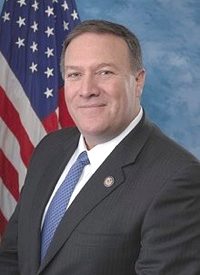
According to CSN News March 2, House Rep. Mike Pompeo (R-Kan., left) has again introduced legislation to repeal all energy tax credits. H.R. 3308, The Energy Freedom and Economic Prosperity Act was first introduced in the House last May by Pompeo. The legislation is now under review in the House Ways and Means Committee, and a Senate version was introduced by Senator Jim DeMint (R-S.C.) and Senator Mike Lee (R-Utah) earlier this month.
On Thursday at a Capitol Hill press conference, Pompeo was joined by DeMint, Lee, and Senator Ron Johnson (R-Wis.) to speak about the bill. It would repeal all energy tax credits, including credits for the production of clean coal, electric and fuel cell vehicles, and enhanced oil recovery. Repealing these credits has drawn comments from critics, but Johnson rightly says that the federal government must “stop picking winners and losers, stop supporting multi-million dollar, billion-dollar boondoggles, things like Solyndra, companies that simply can’t survive in the marketplace on their own.”
Last year, Wichita Liberty posted a May 23 article noting that “U.S. Representative Mike Pompeo (R-Kan.) is getting attacked for standing up for the free market principles that Kansas voters sent him to Washington to defend. You may have seen that T. Boone Pickens is trying to use out-of-state pressure from Oklahoma to lean on Pompeo. Pickens wants Pompeo to end his opposition to Pickens’ effort to get special tax treatment for natural gas vehicles. But Pompeo has it exactly right; Washington shouldn’t be picking winners and losers in the energy industry.”
Last fall RedState.comnoted, “This bill represents a continued effort by Pompeo to reduce government intervention and to give more freedom to markets.”
Indeed, Pompeo said, “We have been uniform and broad and favor no one. We are literally trying to get the federal government’s tax code out of the business of picking winners and losers.”
“It’s time for these industries to compete, to enter their products into the marketplace, and convince customers that the energy that they provide is something that they can afford and they want.”
Perhaps to emphasize their point that government has no place in the free market, the lawmakers criticized Energy Secretary Steven Chu, who on Tuesday testified at a House hearing that the goal of the Obama administration was not to lower gasoline prices but that “the overall goal is to decrease our dependency on oil, to build and strengthen our economy. We think that if you consider all these energy policies, including energy efficiency, we think that we can go a long way to becoming less dependent on oil and [diversifying] our supply and we’ll help the American economy and the American consumers.”
They also remembered that in 2008 candidate Obama told the San Francisco Chronicle that the goal was not to lower gasoline prices but that “the overall goal is to decrease our dependency on oil, to build and strengthen our economy. We think that if you consider all these energy policies, including energy efficiency, we think that we can go a long way to becoming less dependent on oil and [diversifying] our supply and we’ll help the American economy and the American consumers.”
Obama has criticized oil companies and called for ending all credits and subsidies to the oil and gas industry; however, the American Petroleum Institute (API), representing 490 oil and gas companies, responded in a March 1 statement,
It is factually wrong for the president to say that the industry receives "subsidies." A subsidy is a direct payment of money to a person or business by American taxpayers. The president has it backwards, our industry pays the government $86 million a day — the biggest contributor of government revenue than any other industry in the United States.
DeMint said the bill will not affect energy research grants or tax deductions for industries other than energy. He noted that though the House bill and its Senate companion have little chance of being signed by Obama, he believes it’s important to raise awareness about the amount of credits in the tax code.
“A lot of you are probably wondering why we would we do this, this year when we know this president is going to talk about tax reform and eliminating loopholes, but he’s not going to sign it,” he said.
“The president has talked about eliminating credits for big oil. We should eliminate all targeted credits and let the market work.”



